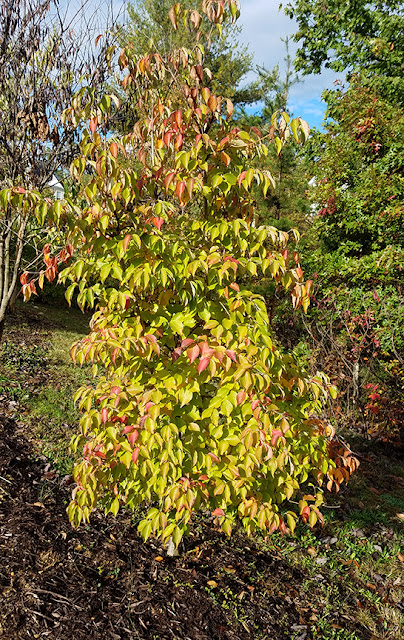 |
| Great Blue Lobelia (Lobelia syphillitica) |
 |
| Great Blue Lobelias |
The dog days of August are coming around again, as they do every summer. After July's record high temperatures, they don't seem so awful, thus far. My Great Blue Lobelias have put forth more flower spikes than ever this year, and they are gorgeous. The crabgrass and weeds are lush, too--I went out yesterday morning to weed around my veggie bed and try to tackle the worst of it in the back yard beds. Two hours later I was drenched in sweat, had one large plastic bag full of weeds, and feeling that I'd barely made a dent. It will take many more sessions to get the weeds under control, in as much as that is at all possible.
 |
| Black or Levant cotton (Gossypium herbaceum ' Nigrum') |
My three black cotton plants grown from Lili's seeds are producing lots of flowers and bolls. The seeds were collected from the U.S. Botanic Gardens a number of years ago (I've seen this exotic annual selling for amazingly high prices in catalogs), and thanks to my daughter-in-law's green thumb, we've managed to keep this line going.
 |
| Black cotton flower bud. |
The following spring the collected seeds went in my garden beds, and I shared some with my daughter-in-law. But with soil as poor as mine, only a few blooms and bolls with seeds developed. Lili had better luck in her garden, and managed to get enough seeds to return the favor last year. The flowers are so lovely! Their beauty is hard to appreciate fully because they tend to hide under the foliage.
 |
| Black cotton flower |
I've done paintings of both the Great Blue Lobelia and the black cotton--my
Great Blue Lobelia painting sold last year, but I still have the watercolor of
black cotton that I painted as Artist in Residence at the U.S. Botanic Garden in 2018. The specimen I worked from didn't have any flowers present so I introduced some from my photos taken of the ones I'd grown. Unfortunately, my photos didn't show the exact way the flower stem grows out from the middle of the leaf petiole, so I didn't get this detail quite right. I'm tempted to try another painting to correct my previous misunderstanding.
 |
| The back yard from the Badlands. |
I took this photo of the back yard from the rearmost bed, the one we call "The Badlands" because the soil there was the worst imaginable. I remember well how little grew here and all along the perimeter of our lot at the edge of the woods. My idea for landscaping this area was to create a transition zone for the huge trees at the edge of the woods with a series of smaller understory trees. These three trees were the first I planted in the back yard: a dogwood, which revealed itself to be a C. k
ousa (Asian) type only this spring, when it finally produced its first blooms, a redbud (
Cercis canadense), and behind that, a Seven Son Flower tree (
Heptacodium miconoides) which is a native of China.
 |
| Seven Son Flower tree (Heptacodium miconoides) |
 |
| Flowering clusters of the Seven Son Flower tree |
The common name for this small tree comes from the observation that the number of flowers in each cluster is usually seven. I bought this
Heptacodium as a sapling on sale for the amazing price of $6--the selling point for me wasn't just the price, but that the tree blossoms in August, at a time when little else in the garden is in bloom, the blossoms are fragrant, and it grows fast. After planting it I've had time to appreciate its other attractive features--in autumn, after the flowers fade, the sepals turn pink, giving the appearance of a second flowering, and the bark peels in layers of different colors that make a wonderful display in winter.
 |
| Basket of begonia. |
I didn't find any fuschias for the hanging baskets on the porch this year, so I bought this beautiful red Begonia instead. Calibrachoas in several colors went in the two other baskets, with the addition of some creeping Jenny (Lysimachia nummularia 'Aurea') hanging over the edges.
 |
| Hanging baskets of Calibrachoas on the porch. |
The recent rains have brought out some new flowers:
Crocosmia 'Lucifer's red flowers make a nice contrast against the fluffy blue
Ageratum, with orange marigolds. The yellow Chrysanthemums are already starting to bloom, despite earlier de-budding. I'm curious to see how the 'Autumn Joy' sedum will look in the fall when the pink Muhly grass puts out some of its plumes--the deer have really chewed up the sedums!
 |
| Herb's bed. |









































